七年级英语At_the_weekend教学案
At-the-weekend-说课稿电子教案

A t-t h e-w e e k e n d-说课稿教学设计学科专业:英语课题名称:5B Unit8 At the weekends教学对象:五年级学生设计者:秋荷英语教育08级1班ⅠAnalysis of the Teaching Material and studentsThe contents: Part A is a dialogue .The lesson is focused on the topic of the activities at the weekends. From this lesson, we can talk about our weekends with each other. This part is important because it is helpful to raise learning interests of the students and it will be also helpful to improve their spoken English.The students:As for students,they are at different levels of English fluency,some of them are not so good at English,some of them have lost interest in English.So during the lesson,I will arrange activities to attract their interest and let them be confident.This is also required in the New Course that students should be actively involved in class,cooperate and communicate with each other.ⅡThe teaching aims1. Knowledge aims:To make the Ss know how to use the sentences: How do you spend your weekends? I often......To make the Ss know how to talk about their weekends with each other.2. Ability aims:To develop the Ss’ abilities of listening, speaking, reading and writing. To train the Ss’ ability of working in pairs.To develop the Ss’ abilities of communication by learning the useful structures.To develop their ability of thinking independently.3. Emotion aims:Arouse their interest in learning English and encourage the students to do many things at the weekends and love life.Ⅲ Difficult and important teaching pointsTo enable the Ss can use the new words, phrases and sentences correctly and skillfully. To develop the Ss’ interest in English.ⅣThe Teaching MethodsTo achieve these teaching aims better, I’ll use the teaching methods below:municative teaching method2.TPRThe purpose of learning English is to cultivate the children’s good sense of English language and their ability to communicate with others. So in this lesson, I’ll mainly use these teaching methods above. I’ll give the children some tasks and arrange five kinds of activities: talking, matching game, watching CAI, acting out the dialogue and having a competition.Ⅴ Teaching aidsAnd in this lesson, CAI, a recorder, word cards and pictures will be needed. They can mobilize the students’ enthusiasm and creativity in learning English.ⅥTeaching procedureIn order to make the teaching process proper and efficient, I divide it into five steps. Step 1 Warming-up1.Free talk (Ask and answer with the students.)What’s the weather like today?What day is it today?What lessons do you have in the morning?What do you usually do after school?2.sing a song<how are you>Purpose: This step is to form a better situation for the students by singing and speaking. Singing can make the students feel pleased and satisfied, and can arouse exciting motion. And free talk can not only review the learned knowledge for the next step, but also can lead the students into a thick English studying atmosphere.Step 2 Pre-readingI will show students a short video about my activities after class and come up with some questions about it."What do I usually do after class?" After they giving the right answers, I’ll ask some students the same question: What do you usually do on Saturdays and Sundays?And i will tell them that Saturdays and Sundays called “week ends" . Present the new word: weekends and write it on the blackboard.Present the new phrase: at the weekends."What do you usually do at the weekends?" Is the same meaning as the "How do you spend your weekends? "Present the new sentence.(Read the new word, the new phrase, the new sentence.)Then, use the new learned sentences to talk about weekends with the students.How do you spend your weekends?I …I ask and the students answer. Next step, students ask and i answer.Ask students to work in pairs and ask his or her partner how do they spend the weekends.This part is the consolidation of the key structure and is an extensive activity for the students.Step 3 While-readingThis step, I’ll present the text.Just now, we talk about our weekends, what a bout Wang Bing’s? How does he spend his weekends? Watch the cartoon and find the answer.This part, I want to train the students’ ability of listening.Watch the cartoon again and try to find out what do the characters of the passage do at weekends.Divide students into 4 groups and each group has a leader. The leader is responsible for collecting answers.Put phrases cards "watch TV""surf the internet""play basketball"......on the blackboard and ask the leader to match the right character with them and fill in the following blank.The group which is quickest and get most right answer is winner and can get presents. Present the new sentence: How does he/she spend his/ her weekends?(Read the sentences.)How does Mike spend his weekends? How does Helen spend her weekends? Then, i will ask students to open the book and read the dialogue by themselves and find the right answers of the multiple choice.1.Helen does ___ at the weekends.A.houseworkB.homework2.Su Hai and Su Yang often ___ at the weekends.A.play chessB.watch cartoons3.Yang Ling likes ___ at the weekends.A.playing footballB.playing on the swingsThe multiple choices are designed here to assess how well the students understand the dialogues.Next,I will ask students to do some T/F questions after reading the dialogues intensively and tell the reasons of why it is false.1.It is Friday morning.2.Helen likes playing basketball.3.Yang Ling likes playing on the swing.Judge is very impo rtant to train students’ reading skills.This step is very important of the lesson. The students read the dialogue loudly and freely. In this course, the students can understand the main contents of this dialogue. They can find the answers by themselves. They will feel happy and successful during this part. There are some new phrases here. For example, watch cartoons, catch butterflies, I think, the students can learn them by themselves. But make sure they can read them well.Step 4 Post-readingAsk students to act the dialogue out.Do a survey. Ask your friends how do they spend their weekends and make a form. In the group activities, they can speak a little English with ease. This will encourage them to speak English.After doing the exercises above,students will be asked to listen to the tape and repeat. Then I will show the summary of the dialogues and ask them to fill in the blanks.At the weekends, Wang Bing often surfs the Internet. Sometimeshe ______ swimming or ______ basketball. He likes ______. Helen likes__________ TV. She and Yang Ling often ___ housework at home. The twins (双胞胎) often _______ cartoons. Sometimes they ______ butterflies in the park.The purpose of it is to help students understand the dialogues better.Meanwhile, during the teaching process, I will give the students some assessments and give presents.Step 5 Homework1. Copy the new words, phrases and sentences four times.2. Try to retell the text.3. Talk about your weekends with your parents and friends.VII Blackboard DesignAt last I will show you my blackboard design.Unit 8 At the weekendsHow do you spend your weekends?I…How does she\he spend her\his weekends?She\he…VIII SummarizeThe teaching aims of this lesson is to develop not only the students’ language abilities, but also the diverse intelligence by integrated teaching methods.Students can’t keep what they have learned long in their mind. It’s necessary and important to assign some meaningful exercises after class. Teacher can check whether students have consolidated the content through the feedback.As teachers, to make our English classrooms shine with vitality, we are laid with heavy burden and we still have a long way to go.Above is all.。
At the weekend教学设计

《At the weekend》教学设计苇町中心小学延亚楠教材分析:本节课的内容是上海教育版五年级下册M2U5《At the weekend》第一课时。
本节课通过Listen and say 关于周末计划的对话,帮助学生掌握句型What are you going to do this weekend ?通过完成课本上的练习反馈,帮助学生掌握句型What is he /she going to do this weekend ?本课是在上节学了一般将来时的陈述句后再学它的特殊疑问句,学生已有了一定的基础,本节课主要是让学生通过各种有趣的活动来体验学习成就感,从而树立自信心,培养初步使用英语进行简单日常交际的能力。
教学目标:1.说教帮助学生学习Look and learn 中的单词。
2.通过Listen and say 关于周末计划的对话,帮助学生掌握句型What are you going to do this weekend ?3.通过完成课本上的练习反馈,帮助学生掌握句型What is he /she going to do this weekend ?教学重点:1. 帮助学生学习Look and learn 中的单词。
2.通过Listen and say 关于周末计划的对话,帮助学生掌握句型What are you going to do this weekend ?教学难点:通过听说训练,学习用英语交流。
教学过程:一、导入明标1.课前了解目标。
(让同学们自己了解目标及重难点,做到心中有数。
)2.Sing a song.(通过相关歌曲,很快就激发学生的学习兴趣。
)3.Think and say(复习已学活动类的词汇,巩固所学词组。
为课文学习做准备。
)二、探究新知1. 主题阅读,为后续学习做准备。
教师给出语言材料,引导学生用已学知识表述自己的周末生活。
(教师承上启下表引出新词组。
)row a boat see a film2.了解课文大意。
最新外研版七年级下册英语Module 3 Making plans-Module 3 教学设计

Module3 Making Plans一、教学内容:Unit1 What are you going to do at the weekend?二、课型:Listening and speaking三、教学目标:1、能够正确使用下列单词和词组:go over, picnic, housework, on, else, nobody, at,nothing, silly, fantastic.2、能够听懂包含计划、安排的对话,并且判断出对话中人物的计划。
4、能够与人做有关计划的对话。
3、能用be going to表达自己的计划、安排,并能询问对方的计划、安排。
四、教学重难点:1、能够听懂对话中计划、安排的对话。
2、能够正确使用“ be going to” 来描述计划的相关信息。
五、教学准备:课堂整体运用任务型教学模式,培养学生独立自主的学习能力。
本课指导学生通过听说获取信息,培养学生的听说技能。
在教学过程中,采用多媒体手段辅助教学,利用各种图片和习题任务贯穿整个教学过程。
因此,本节课需准备:PPT课件、挂图、录音机、课堂练习表格、奖品六、教学过程:教学步骤教师活动学生活动设计意图Step One Warming -up (3’)Lead in1. Play a guessing game:Do actions and ask : Now,boys and girls, do you knowwhat am I doing?2.OK, you all did a goodjob. Now we are having alesson, but do you knowwhat am I going to dotomorrow?1. Guess and say the sentenceslike this: “You are sleeping…”“You are drinking…” makethe students do the actions andthe other students guess likethis: “He is fishing…She’s …”2. Students guess like this:You’re going to …以旧引新,先引导学生回顾相似的语法结构bedoing.通过这个环节,可以引导学生把一般现在进行时和一般将来时进行简单的对比了解。
外研版英语七年级下册:Module 3 Unit 1 What are you going to d

教学设计外研版七年级下册课题:Module 3 Making plans Unit 1:What are you going to do at the weekend?一.课型; Listening and speaking二.教材分析本单元是第三模块的核心组成部分,以讨论周末计划为主要话题。
该话题比较贴近学生生活,因此学生对介绍自己的周末计划很感兴趣,很容易展开教学活动,便于学生理解运用。
本节课在学生掌握有关周末活动的动词短语的基础上,在大量听说训练的基础上,通过讨论周末计划,学习用be going to 表达自己打算或计划做的事。
三.学生分析本节课的授课对象是七年级学生,他们活泼好动,善于表现自己,大多数学生对英语学习很感兴趣,尤其是在进行口语练习的环节时,都很积极。
本节课在设计用be going to 谈论周末计划这一话题时,设计了大量的pairwork 练习,便于学生根据自己的实际情况展开活动。
这节课的设计以学生感兴趣内容为出发点,以培养学生的听说能力为目的,使学生积极参与到课堂中来。
并充分利用多媒体等教学辅助设备,加强直观印象,增加课堂教学的趣味性。
四.教学目标根据《中学英语课程标准》制定如下目标:语言知识目标1. 学习掌握本课生词与短语:plan, go over, picnic, have a picnic, nothing,silly, fantastic, nobody, housework, else2. 观察并了解be going to 形式的构成, 能简单使用一般将来时(am/is/are going to do sth)3. 通过用英语与同伴谈论自己和周围人们打算做的事, 进一步熟悉be going to的用法。
语言技能目标1.听:能听懂含有be going to 加动词原形所表达的意思,并能听懂他人谈论周末计划的内容。
2.说:能借助所给词组进行pairwork 练习,能用be going to 谈论周末计划。
初中英语_What are you going to do at the weekend?教学设计学情分析教材分析课后反思

初一的学生,由于年龄小,抽象思维能力比较低,注意力容易分散。
他们的形象思维能力强,又加上生性活泼好动,喜欢直观形象思维,对游戏、动画片和小组活动特别感兴趣。
初一是中学生学习英语的基础阶段,这一阶段的重要任务在于激发并保持学生学习英语的兴趣。
因此,在设计课堂教学活动时一定要根据学生的情况,采用灵活多样的教学方法来吸引学生的注意,努力营造玩中学、学中玩的教学情境。
根据教育心理学,如果学生对于一件事物有极大的兴趣,他们就会排除主观和客观的种种消极因素,尽量全身心地投入到知识的学习中去。
初一学生的学习心理特点:(1)兴趣:对英语普遍感兴趣,但有很大的不稳定性,好奇心强,求知欲旺盛,已不满足教师对课文的简单重复。
(2)记忆:对刺激记忆手段多的知识记忆深刻,遵从记忆规律。
(3)思维:偏重于形象思维,对片面,零碎的材料尚缺乏一定的概括分析能力。
因此,在本学科的教学过程中,在注重启发引导,培养学生分析、概括能力的同时,更要注重教学方法的灵活性,通过任务型教学法,情景交际法,全身反应教学法等,激发学生学习的兴趣,让学生乐于接受,易于接受。
初一学生有着极强的求知欲和表现欲。
根据学生的心理特点,我在课堂上多以表扬为主,注重对学生英语学习兴趣的培养,鼓励他们大胆说、积极做、努力讲!让学生们在玩玩、做做、说说、唱唱中学习英语。
总之,初一学生,对英语的学习热情较高,可塑性较强,只要在教学中,教师加强对学生的学法引导和学习习惯的培养,学生的英语学习一定会取得很好的成绩。
在本课时的教学中,我较好地完成了教学工作,达到了本课时的教学目标,通过本课时的教与学,学生掌握了本课新语法be going to do和有关动词词组,利用图片来引导学生开展重点句型的训练,效果非常好,绝大多数同学都参与了口语操练,而且自然地从句过渡过最后介绍自己周末计划的表达上,对培养学生的口语起到了非常大的作用,顺利完成语言输入的目标。
上完这节课,感觉学生非常配合,能顺利地、很好地完成教学任务。
外研版英语7年级下册:Module 3 Unit 1 What are you going to d

《Module 3 Making plans Unit 1 What are you going to do at theweekend ?》教学设计一、课题:《Module 3 Making plans Unit 1 What are you going to do at the weekend ?》是外研版《新标准》七年级英语下册第三模块第一单元的内容。
二、教材分析:本模块以“制定计划”为中心话题,此话题的选择十分符合教学和学习的实际。
通过一个学期的初中学习,本模块的学习能帮助学生逐步养成良好的有计划的学习和生活习惯。
对于那些已经有了良好的计划意识的学生来说,通过本模块的学习能够更加坚定他们的信心,在总结分享自己的经验过程中能更好的计划自己的学习、生活乃至人生。
第一单元是一节听说课型的新授课,主要以对话的形式呈现,学生在掌握一些关于周末活动的动词词组的前提下,与同学们谈论周末的计划、安排,学习用“be going to”句型表达自己打算或计划要做的事情,表达对周末生活的期待。
本单元因为是本模块的第一单元,学生在学习过程中进行充足的输入准备,不必对“be going to”句型所有人称的使用都能熟练掌握。
三、学情分析:七年级的学生经过小学和上一学期的英语学习,已经具备了英语的基本语言能力,能够说出一些有关于周末计划的动词短语,但是学生的周末生活并不是那么丰富,教师为学生提供了一些相关课外活动的图片来扩充一些相关词汇,教师也可以引导学生谈论一个“有趣”或“有意义”的周末计划,避免学生一张口只会说一些“doing homework”或“watching TV”的现象,同时可以对学生进行做有意义的事的德育渗透,并且对于那些学习和生活中缺乏计划的学生来说,这个话题可以帮助他们逐步建立起良好的、有计划的生活和学习习惯。
四、教学目标:1. 语言知识目标(1)话题:计划与安排(2)功能:能谈论和制订周末的计划、安排(3)语法:能理解“be going to”的意义并尝试使用(4)词汇:能理解并掌握下列词汇、短语、句型名词:plan, picnic, housework ;形容词:silly, fantastic;代词:nothing, nobody;副词:else, forward;介词:on, at;短语:go over, have a picnic, at the weekend句型:What are you going to do? I’m going to …. Are you going to …? Yes, we are.No, we aren’t.(5)语音:掌握元音字母“i”在重读开音节中读[ai]、在重读闭音节中读[I]以及读[i:]与半元音字母“y”在在重读音节中读[ai]、在非重读音节中读[I]2. 语言技能目标(1)听:能听懂本课有关周末的计划、安排的对话,并能判断出对话中人物的计划(2)说:能用“be going to”谈论自己的周末计划,并询问他人的计划(3)读:能模仿点读笔声音洪亮、语音语调准确、流畅地朗读本课对话3. 学习策略目标能根据自己的具体情况制定自己的学习和生活计划,并能与同学分享自己的计划4. 情感与态度目标形成自主学习的能力,养成有目的、有计划地做事的好习惯。
外研版七年级英语下册module3教案

Module 3 Making plansUnit 1 What are you going to do at the weekend?一、教学目标 :1. 语言知识目标:1) 掌握本单元所学单词及短语:go over, picnic, housework, on, else, nobody, at,nothing, silly, fantastic...2) 掌握be going to do的用法。
2. 情感态度价值观目标:利用所学表达制订计划的句型有礼貌地邀请别人参加某种活动二、教学重难点:1、利用所给信息谈论周末计划2、“be going to +动词原形”句型的用法三、教学过程Step 1 Warming-up1. Show some pictures of school things. Say what they are.2. Read the words after the teacher.3. Introduce the new words.Step 2 Match1. Ask the students to read the word and expressions in Activity 1.2. Match the words and expressions from Box A with the word and expressionsfrom Box B.3. Call back the answer from the whole class and check the answer.4. Match the expressions in Activity 1 with the pictures in Activity 2.5. Read the expressions together.Step 3 Listen and read.1. Play the recording and ask the students to listen and read the conversation.2. Read the conversation again and answer the questions.1) What’s Daming going to do on Saturday morning?2) What’s Betty going to do on Saturday afternoon?3) Who is going to have a piano lesson on Saturday?4) Where are they going to have a picnic?3. Ask the students to check with a partner.4. Play the recording again .Check the answers..Step 4 Complete the conversation1. Ask the students to read the words in the box in Activity 4.2. Read through the conversation.3. Complete the conversation with the correct form of the words from the box.4. Ask the students to check with a partner.5. Check the answers.6. Read the conversation loudly.Step 5 Listen and repeat1. Play the recording once without stopping.2. Play the recording again and stop at the end of each line. Ask the whole class torepeat.3. Play the recording again and stop at the end of each line. Ask individual studentsto repeat.4. Ask the students to practice the sounds in pairs.Step 6 Work in pairs.Ask and answer questions about your plans at the weekend.1. Ask and answer like this:— What are you going to do on Saturday morning?—I’m going to check my email and do my homework.2. Read through the example with the class.3. Pair them to ask and answer.4. Circulate and monitor their production.5. Complete the diary.Step 7 Language pointsand do my homework.1. On Saturday morning, I’m going to check my email如果特指“在具体的某一天”或“(在具体的某一天的)上午、下午、晚上”等,须用介词on。
牛津小学英语5BUnit8《Attheweekends》教案(通用11篇)

牛津小学英语5BUnit8《Attheweekends》教案(通用11篇)教案是教师为顺利而有效地开展教学活动,根据课程标准,教学大纲和教科书要求及学生的实际情况,以课时或课题为单位,对教学内容、教学步骤、教学方法等进行的具体设计和安排的一种实用性教学文书。
以下是小编为大家收集的牛津小学英语5BUnit8《Attheweekends》教案(通用11篇),仅供参考,欢迎大家阅读。
牛津小学英语5BUnit8《Attheweekends》教案篇1 牛津英语Unit6AtaPElesson教案Unit 6 At a PE lessn第五课时一、教学内容5B.Unit 6 E,G,H 部分.1.复习人体部位名称,以及体育课上的动作词组, D.E部分2.复习祈使句3.复习现在进行时二、教学目标1.通过复习,要求学生能熟练地掌握本单元所学的有关活动类词汇。
2.能熟练的在情景中运用本单元所学的.句型和日常交际用语。
3 能初步了解字母组合ai和a在单词中的发音。
三、教学重、难点能正确听说读写四会句型“Put…n… Tuch…with… All right.”四、课前准备1.准备录音机和本课唱歌的磁带。
2 准备E部分图片3.课前写好本课的课题5B.Unit6.五、教学过程Step 1 Organizatins.1. GreetingsT: Gd rning/afternn, bs and girls.Ss: Gd rning/afternn, Miss Zhang.2. Let’s sing a sng.学生听录音跟读唱英语歌曲 Tw acets.Step2 Revisin1. Free talT: Wh’s n dut tda Ss: I a.T: What da is it tda Ss: It’s Mnda.T: What subect d u lie Ss: I lie…T: What class are u in Ss: I’ in Class Tw.T: What lessns d u have n Mnda Ss: We have…2. 教师出示人体图片,请学生快速说出人体部位名称3.请同学板演默写人体部位名称单词新课标第一网Step3 L and read1. 教师出示图片,复习单词 a pineapple, a grape, an egg, a head和a uth2. 师生问答:Can u … es, I can. N, I can’t.以及Where’s … It’sin …3. 教师出示图片,指导学生看图,并练习读句子。
外研版新标准英语七年级下册M3 Unit 1 What are you going to do at the weekend英文教案

Unit 1 What are you going to do at the weekend?(一)【教学目标】:1 功能:计划、打算、意图的表达与询问。
2 语法: be going to 的意义和用法。
3 语音:含有be going to 的句子的读音及L 系列辅音组合的发音。
4任务:(1) be going to 句型介绍自己对一周学习或其他活动的计划安排。
(2) 词汇:1 plan 计划 2 revise 温习;复习 3 picnic 夜餐 4 test 测试(二) 重点:1一般将来时的定义:表示打算、计划、准备、将要做某事。
结构:be going to +动词原形例如:What are you going to do this afternoon?你今天下午打算做什么?2because引导的原因状语从句3 动词词组A teaching plan for Unit 1,Module 3一、Teaching materials:Unit 1 What are you going to do at the weekend? (Module 3 Plans)二、Targets for this period:To understand conversations about planTo get special information from the listening passageTo talk about one’s plan on weekend三、Key points:Key vocabulary—plan to do something, revise for one’s test, have a picnic/part y, have a piano lesson, do some sightseeing, go sightseeing/shopping/cycling, cook dinner, go to the beach, stay in bedKey structures—What is he / she/ your friend going to do on weekend?What are you / they going to do on weekend?四、Teaching methods:Interactive approach五、Teaching aidsTape recorder, OHP六、Teaching arrangements:Step One Lead-in1. Students talk about the following questions in small groups:1) Do you like weekend?2) Why do you like weekend?3) What do you usually do on weekend?2. Show some new phrases and ask the students to remember themplan to do something, revise for one’s test, have a picnic/party, have a piano lesson, do some sightseeing, go sightseeing/shopping/cycling, cook dinner, go to the beach,stay in bedStep Two Presentation1. Show the sentence structure “be going to” with examples and pictures.----What is he going to do? ----He is going to…(将要做某事)----He is going to check his email.----He is going to do his homework.2. Students look at more pictures and make sentences.1) ----What is she going to do?----She is going to have a birthday party / cook dinner / go to Sydney / take the plane / take the boat.2) ----What are they going to do?----They are going to eat dinner / have a party / have a picnic / go to the beach /watch TV / play soccer / go to the theater / buy some clothes / play volleyball.3) ----What is he going to do?----He is going to study for a test / have a piano lesson / go sightseeing / go cycling / play volleyball / play basketball / go swimming / go shopping / go fishing Step Three Listening (Activity 3)1. Students listen to the tape and choose the correct answers. (Activity 4)1) What’s Daming going to do on Saturday morning?D He is going to check his email.H He is going to do his homework.2) What’s Betty going to do on Saturday afternoon?G She is going to buy clothes.3) What’s Betty and Daming going to do on Saturday evening?C They are going to go to the party.4) What are Daming, Betty, Tony and Lingling going to do on Sunday afternoon?A They are going to have a picnic.5) What’s Daming going to do on Sunday morning?F He is going to get up early.I He is going to play table tennis.6) What’s Betty going to do on Sunday morning?B She is going to stay in bed.E She is going to revise for her test.2. Students listen again and complete the diary. (Activity 7)Daming BettySaturday Morning Check email Do homeworkAfternoon Have a piano lesson Buy some clothesEvening Go to a party Listen to some music Go to a party Listen to some music Sunday Morning Get up early Play table tennis Stay in bed Revise for her test Afternoon Meet Lingling and Tony in the park Have a picnic Meet Lingling and Tony in the park Have a picnicevening3. Students ask and answer in pairs according to the diary.e.g. ----What’s Daming going to do on Saturday morning?----He’s going to check his email and do h is homework.Step Four To practice reading aloud the conversation in groups of two.Step Five Detail explanation (Activity 3)1. Would you like to come? = Do you want to come?2. revise sth = go over sthe.g. I must revise my English notes for my exam.Step Six To act out the conversation.Step Seven To listen and repeat (Activity 5&6)Step Eight Summary: be going to do sth. 表示自己打算或计划做某事.be 的形式要根据主语来确定。
Unit11Attheweekend教案
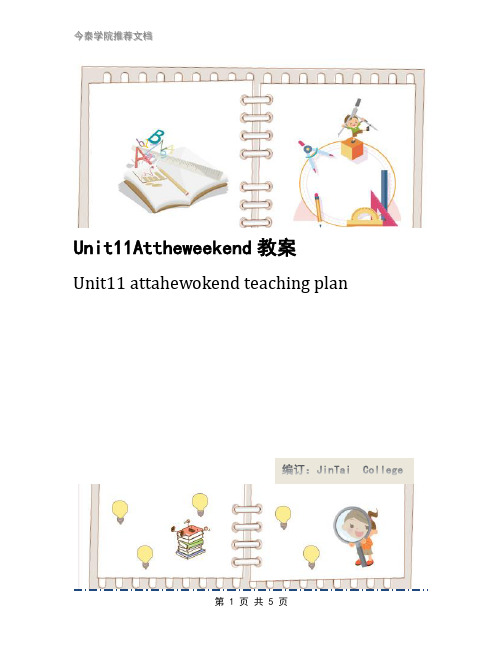
Unit11Attheweekend教案Unit11 attahewokend teaching planUnit11Attheweekend教案前言:小泰温馨提醒,英语作为在许多国际组织或者会议上都是必需语言,几乎所有学校选择英语作为其主要或唯一的外语必修课。
英语教学涉及多种专业理论知识,包括语言学、第二语言习得、词汇学、句法学、文体学、语料库理论、认知心理学等内容。
本教案根据英语课程标准的要求和针对教学对象是初中生群体的特点,将教学诸要素有序安排,确定合适的教学方案的设想和计划、并以启迪发展学生智力为根本目的。
便于学习和使用,本文下载后内容可随意修改调整及打印。
unit 11 at the weekend教案content: unit11 readingperiod:3-2teaching aims and demands:1.be able to understand the passage and get the information。
2.be able to tell or write one’s day.3.to help the ss plan their weekends to do more meaningful things instead of sleeping, playing games or watching tv.key points:1.be able to understand the passage and get the information。
2.be able to tell or write one’s day.difficult points:be able to te ll or write one’s day.teaching aids:a tape recorder, some picturesteaching methods:task-based teaching approachcooperative learning approachteaching procedures:1 check the homework.2 revise lily’s family at the weekends orally.3(1) say lil y’s family enjoy their weekends very much, what about you?…and how about miss gao? please read the text and tell me.(she enjoys her weekends very much, too.)(2) t: how do you know the answer?get ths ss to read her activities.learn the new words and the phrases in the text.(3) read the text and match the words with the pictures.ⅱ practice1 tell if the sentences are true or false inp117,sb,a.2 p58, and answer.answer the different kinds ofquestion. help the ss to work out the rules.ⅲ production1 interview one of your classmates or the teacher about their weekends.say something about their who hasa wonderful weekend.2 class work: rewrite nick’s day inunit10.ⅳhomework1 learn the new words and phrases by heart.2 finish exercise b in page117,sb.3 rewrite nick’s day in unit 10 like this:hello! this is nick….4 preview grammar ,pronunciation and task. :a. read the new words.b. read the pronunciation.c. finish the exercises:starter unit11 at the weekendtotal periods: 3unit11 readingperiod: 3-2课堂达标检测rewrite nick’s day in unit 10 like this: hello! this is nick. he often gets up at7.00a.m._________________________________________________ _________________________________________________________ _________________________________________________________ _________________________________________________________ ______________________________课后预习作业(20分)一、写出下列动词的第三人称单数形式。
5B__Unit8_At_the_weekends_说课稿_

小学牛津英语5B Unit8 At the weekends Part A第一课时说课稿仪征市刘集小学马凤娟一、教材分析说课的内容是牛津小学英语5B Unit 8 At the weekends Part A第一课时,这个单元的核心内容是“周末活动”。
Part A涉及的句型有:How do you spend your weekends? How does he/she spend his/her weekends? 这些和Unit 4的句型What does he/she usually do on Sundays? He/She usually …有一定联系。
二、学情分析:通过几年的英语的学习,五年级的学生都积累了一定的英语基础,在加上在第四单元中已经学过句型What does he / she usually do on Sundays ? He /She usually… ,学生对第三人称有一定的认识,也为本单元的学习打下了很好的基础,教师应该利用学过的知识结合各种形式的活动,使学生在情景中自然导入到新知识的学习。
三、教学目标:课程标准强调知识与技能、过程与方法、情感态度与价值观三个角度的有机结合,本着这样的认识,我对本课时设计了如下教学目标:1.情感目标:通过活动,游戏,儿歌等形式让学生在老师创设的氛围中敢于,乐于,善于开口讲英语,积极参与交流。
并通过谈论和交流周末生活,知道怎样度过周末更有意义并体会生活的美好,从而更加热爱和珍惜现在的美好的生活。
2.认知目标:(1)掌握对话中出现的关于昆虫的三会新单词butterfly以及其复数形式butterflies。
(2)掌握对话中出现的词组,如catch butterflies, watch cartoons, at the weekends, learn from等。
(3 )句型:How do you spend your weekends? I often… ,sometimes I … How does he/she spend his/ her weekends?He / She often … , sometimes he / she …(4)能模仿对话的语音语调,理解并熟练的朗读对话,读音准确。
At the weekend说课稿
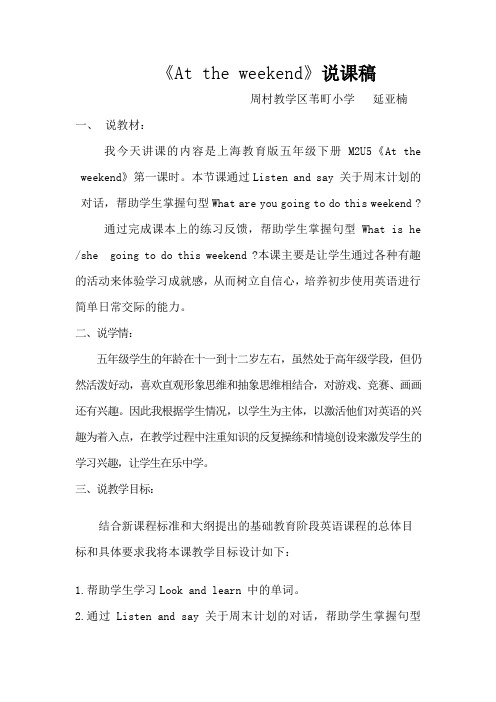
《At the weekend》说课稿周村教学区苇町小学延亚楠一、说教材:我今天讲课的内容是上海教育版五年级下册M2U5《At the weekend》第一课时。
本节课通过Listen and say 关于周末计划的对话,帮助学生掌握句型What are you going to do this weekend ?通过完成课本上的练习反馈,帮助学生掌握句型What is he /she going to do this weekend ?本课主要是让学生通过各种有趣的活动来体验学习成就感,从而树立自信心,培养初步使用英语进行简单日常交际的能力。
二、说学情:五年级学生的年龄在十一到十二岁左右,虽然处于高年级学段,但仍然活泼好动,喜欢直观形象思维和抽象思维相结合,对游戏、竞赛、画画还有兴趣。
因此我根据学生情况,以学生为主体,以激活他们对英语的兴趣为着入点,在教学过程中注重知识的反复操练和情境创设来激发学生的学习兴趣,让学生在乐中学。
三、说教学目标:结合新课程标准和大纲提出的基础教育阶段英语课程的总体目标和具体要求我将本课教学目标设计如下:1.帮助学生学习Look and learn 中的单词。
2.通过Listen and say 关于周末计划的对话,帮助学生掌握句型What are you going to do this weekend ?3.通过完成课本上的练习反馈,帮助学生掌握句型What is he /she going to do this weekend ?四、说教学重点、难点1. 帮助学生学习Look and learn 中的单词。
2.通过Listen and say 关于周末计划的对话,帮助学生掌握句型What are you going to do this weekend ?五、说教法根据学生特点即本节课的活动内容,我设计了情景教学法、小组活动学习法、图片问答法、鼓励法等方法来帮助学生掌握新知。
外研版英语七年级下册Module 3 《What are you going to do at the weekends》导学案
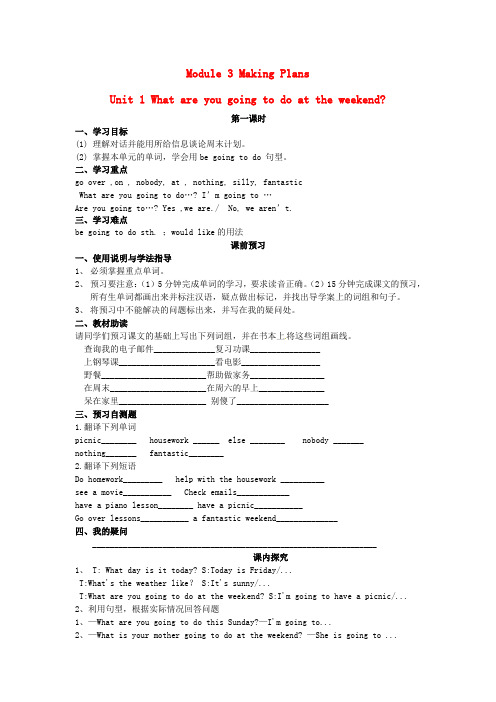
Module 3 Making PlansUnit 1 What are you going to do at the weekend?第一课时一、学习目标(1) 理解对话并能用所给信息谈论周末计划。
(2) 掌握本单元的单词,学会用be going to do 句型。
二、学习重点go over ,on , nobody, at , nothing, silly, fantasticWhat are you going to do…? I’m going to …Are you going to…? Yes ,we are./ No, we aren’t.三、学习难点be going to do sth. ;would like的用法课前预习一、使用说明与学法指导1、必须掌握重点单词。
2、预习要注意:(1)5分钟完成单词的学习,要求读音正确。
(2)15分钟完成课文的预习,所有生单词都画出来并标注汉语,疑点做出标记,并找出导学案上的词组和句子。
3、将预习中不能解决的问题标出来,并写在我的疑问处。
二、教材助读请同学们预习课文的基础上写出下列词组,并在书本上将这些词组画线。
查询我的电子邮件______________复习功课________________上钢琴课______________________看电影__________________野餐________________________帮助做家务_________________在周末______________________在周六的早上_______________呆在家里____________________ 别傻了_____________________三、预习自测题1.翻译下列单词picnic________ housework ______ else ________ nobody _______nothing_______ fantastic________2.翻译下列短语Do homework_________ help with the housework __________see a movie___________ Check emails____________have a piano lesson________ have a picnic___________Go over lessons___________ a fantastic weekend______________四、我的疑问_________________________________________________________________课内探究1、 T: What day is it today? S:Today is Friday/...T:What's the weather like? S:It's sunny/...T:What are you going to do at the week end? S:I'm going to have a picnic/... 2、利用句型,根据实际情况回答问题1、—What are you going to do this Sunday?—I'm going to...2、—What is your mother going to do at the weekend? —She is going to ...3、—what are your friends going to do at the weekend?—They are going to... 3、听录音掌握大意并完成Activity4.(一)1、听力练耳 Listen and match (听录音,连线组成短语,然后朗读这些短语,背诵) 2、Write the phrases in Activity1 and the picture.(Activity2)(二)对话处理读前听Listen to the dialogue, and answer the questions.1、Is Daming going to check his email?2、Is Betty going to a party at a friend’s home on Saturday evening?3、What is Daming going to do on Saturday afternoon?听后读:最大声、最准确的朗读对话一遍,说一说Betty和Daming的计划。
AT THE WEEKEND教案
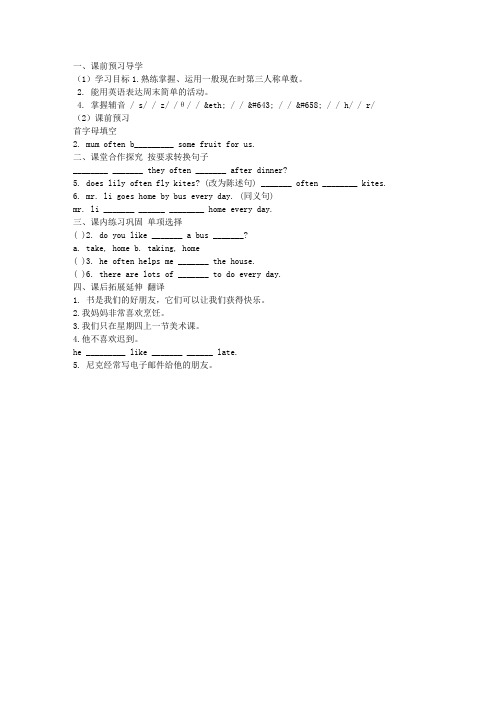
一、课前预习导学(1)学习目标1.熟练掌握、运用一般现在时第三人称单数。
2. 能用英语表达周末简单的活动。
4. 掌握辅音 / s/ / z/ /θ/ / ð / / ʃ / / ʒ / / h/ / r/ (2)课前预习首字母填空2. mum often b_________ some fruit for us.二、课堂合作探究按要求转换句子________ _______ they often _______ after dinner?5. does lily often fly kites? (改为陈述句) _______ often ________ kites.6. mr. li goes home by bus every day. (同义句)mr. li _______ ______ ________ home every day.三、课内练习巩固单项选择( )2. do you like _______ a bus _______?a. take, homeb. taking, home( )3. he often helps me _______ the house.( )6. there are lots of _______ to do every day.四、课后拓展延伸翻译1. 书是我们的好朋友,它们可以让我们获得快乐。
2.我妈妈非常喜欢烹饪。
3.我们只在星期四上一节美术课。
4.他不喜欢迟到。
he _________ like _______ ______ late.5. 尼克经常写电子邮件给他的朋友。
七年级英语At the weekend教案3

Starter Unit 11 At the weekend主备人:执教人:执教班级:执教时间:年月日Content: Unit11 Grammar ,Pronunciation and TaskPeriod:3-3Teaching aims and demands:1. Be able to ask and answer questions to get the information about one’s weekend.2. Learn to add “-s”, “es” “ies”to the verbs and use them correctly...3. Be able to read the consonants.4. To be care about their own and the others’ life.Key points:1. Learn to add “-s”, “es” “ies”to the verbs and use them correct ly...2. To be care about their own and the others’ life.Difficult points:1. Learn to add “-s”, “es” “ies”to the verbs and use them correctly...Teaching aid:A tape recorderTeaching methods:1 Task-based teaching approach2 Cooperative learning approachTeaching procedures:Starter Unit11 At the weekendTotal periods: 3Unit11 Grammar ,Pronunciation and TaskPeriod: 3-3课堂达标检测一、用所给词的正确形式填空。
Unit5At-the-weekend教案

Module 2 Work and playUnit 5 At the weekend〔第一课时〕教学时间:教学目标:1、通过Listen and say中关于周末方案的对话,帮助学生掌握本单元的核心句型。
2、通过look and learn栏目,帮助学生学习本单元的生词。
3、通过完成课本上的反响练习,帮助学生掌握句型What is he/she going to do this weekend?教学重、难点1、能掌握单词weekend, stay, film, boat, plan, tomorrow, see a film2、会运用句型 What are you going to do this weekend?教学方法:任务教学法、情景教学法。
教学过程:Module 2 Work and playUnit 5 At the weekend〔第二课时〕教学时间:教学目标:1、通过Do a survey的活动,引导学生相互询问周末方案,并完成口头汇报。
2、通过Think and write的写作活动,让学生写一写自己周末的方案,进一步稳固和运用核心句型。
3、帮助学生学习字母o及字母组合oa,oe在单词中的发音。
教学重、难点句型: ually...this weekend, ...is/are...going to...语音: o(flo), oa(goat), oe(Joe)教学方法:任务教学法、情景教学法。
教学过程:Module 2 Work and playUnit 5 At the weekend〔第三课时〕教学时间:教学目标:1、通过Read a story的阅读及反响练习,帮助学生进一步理解一般将来时的用法,同时让学生懂得“今日事,今日毕〞的道理。
2、通过学习任务(task),帮助学生稳固和综合运用本单元所学的知识和技能,与同学交流周末方案,再介绍别人的周末方案。
教学重、难点词汇:build,next,cry,until教学方法:情景教学法。
《At the weekend》优秀教案
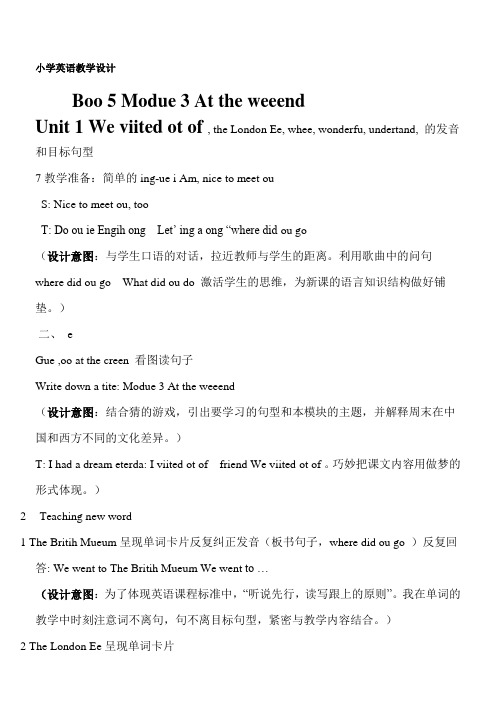
小学英语教学设计Boo 5 Modue 3 At the weeendUnit 1 We viited ot of , the London Ee, whee, wonderfu, undertand, 的发音和目标句型7教学准备:简单的ing-ue i Am, nice to meet ouS: Nice to meet ou, tooT: Do ou ie Engih ong Let’ ing a ong “where did ou go(设计意图:与学生口语的对话,拉近教师与学生的距离。
利用歌曲中的问句where did ou go What did ou do 激活学生的思维,为新课的语言知识结构做好铺垫。
)二、eGue ,oo at the creen 看图读句子Write down a tite: Modue 3 At the weeend(设计意图:结合猜的游戏,引出要学习的句型和本模块的主题,并解释周末在中国和西方不同的文化差异。
)T: I had a dream eterda: I viited ot of friend We viited ot of 。
巧妙把课文内容用做梦的形式体现。
)2Teaching new word1 The Britih Mueum 呈现单词卡片反复纠正发音(板书句子,where did ou go )反复回答: We went to The Britih Mueum We went to …(设计意图:为了体现英语课程标准中,“听说先行,读写跟上的原则”。
我在单词的教学中时刻注意词不离句,句不离目标句型,紧密与教学内容结合。
)2 The London Ee 呈现单词卡片T:who can read itS: the London EeT:We viited the London Ee(课件呈现句子,The London Ee i a big whee ,单词卡片:whee3 wonderfu 呈现单词卡片:T: I thin the London Ee i wonderfu do ou now about the great wa How aboutthe great wa the great wa i wonderfuHow about the eow river the eow river i wonderfu , too(设计意图:英语教学同时也是语言教学,因此,语言是一种活的知识,它需要不断的去在现实中应用。
- 1、下载文档前请自行甄别文档内容的完整性,平台不提供额外的编辑、内容补充、找答案等附加服务。
- 2、"仅部分预览"的文档,不可在线预览部分如存在完整性等问题,可反馈申请退款(可完整预览的文档不适用该条件!)。
- 3、如文档侵犯您的权益,请联系客服反馈,我们会尽快为您处理(人工客服工作时间:9:00-18:30)。
七年级《牛津初中英语预备课程》教学案Unit 11 At the weekend要点直击1.Does Nick play computer games too much at the weeke尼克在周末电脑游戏玩得太多吗?too much 太多,此处表示程度,如watch TV too much ;too much后也可以接不可数名词,如too much homework/water。
2.She sometimes helps me clean the house.她有时帮我打扫屋子。
help sb. do/to do sth. 意为帮助某人做某事,如help the boy (to)wash the dishes。
help sb. with sth.也有此含义,如Dad often helps me with my English。
3.He sometimes writes e-mails to his friends.他有时发邮件给朋友们。
write e-mails to sb. 也可表达为e-mail sb.4.She likes to tell us about her weekends.她喜欢告诉我们周末的情况。
tell sb. about sth. 是“告诉某人关于某事”的意思。
例:She tells him about her school.5.She doesn’t take a bus home. 她不乘公共汽车回家。
take a bus home 也可以表达为go home by bus; 类似的表达式还有walk home/ go home on foot; ride to school/ go to school by bike等等。
6.She enjoys walking down the street and saying hello to her neighbours.她喜欢沿着街道散步,向邻居们问好。
enjoy doing sth.意为like doing sth. 喜欢做某事say hello to sb.意为“向…问好”,例如say sorry to …,say goodbye to…等等。
7.我们在上个单元学过了当主语是第三人称单数以外的人称时,一般现在时的结构为:“主+动词原形”,变否定和一般疑问问句时要借助助动词“do”。
如果主语是第三人称单数,又会出现什么情况呢?这就是我们本单元要学习的内容。
当主语是第三人称单数时,其结构为“主+动词的第三人称单数形式”,第三人称单数形式的具体规则如下:1)一般情况下,动词原形后面加上s,在清辅音后面读/s/,在元音和浊辅音后面读/z/。
如:play—plays, work—works, get—gets, read—reads。
2)如果动词是辅音字母加y结尾的,则要把y变成i再加上es,一般读/z/。
如:fly—flies, carry—carries, study—studies。
3)以s, x, ch, sh 结尾的动词,要加上es,一般读/iz/。
如:pass—passes, watch—watches, wish—wishes。
4)以o结尾的动词,要加上es, 一般读/z/,如:go—goes, do—does。
8.Does Nick often play with you? 尼克常和你一起玩吗?play with sb. 意为“和某人一起玩” chat with sb. 意为“和某人聊天”9.By the way, would you like to play with us now?顺便问一下,你想现在和我们一起玩吗?by the way 意为“顺便说一下”。
例如:By the way, what do you do?1.would like to do sth. 意为“愿意做某事”。
例如:Would you like to go to the park with us?/ Do you want to go to the park with us?11.It’s nice to meet you.见到你很高兴。
同“Nice to meet you.”。
课堂检测一、用所给词的适当形式填空。
1.Mum ______(go) shopping at the weekend.2._____ Tom often______(do) some reading in the afternoon?3.Would you like ______(play) football with me?4.He sometimes ______(stay) at home on Saturday.5._______(not be) late for class again.6.Where _____ she ______(study)? She _______ (study) in No.1 Secondary School.7.Let the boy ______(come) into the classroom.8.She can _______(chat) with friends on the Internet.9.How long ______ you ______(sleep) a day?10.He _______ (eat)a big breakfast in the morning.二、翻译下列短语。
1. 打排球______________________2. 去购物____________________3. 看报________________________4. 吃晚饭____________________5. 参观博物馆__________________6. 帮助某人做某事____________7. 在周末______________________ 8. 和某人聊天________________9. 听音乐______________________ 10. 在网上____________________三、句型转换,每空一词。
1.Lin Tao studies very hard.(改为一般疑问句并作肯定和否定回答)______Lin Tao______ hard? Y es, he _______. No, he _______.2.I watch TV only on Sundays.(变为否定句)I ______ ________ TV only on Sundays.3.My sister does housework every day.(变为否定句)My sister ______ _______ housework every day.4.Lily goes shopping with her mother.(对划线部分提问)______ ______ lily _______ shopping with?5.Does she often help you with the shopping?(同义转换)Does she often help you _____ some _______?6. There are sixteen boys and fourteen girls in my class. (同义句)We _________ students in my class.7. The dog isn’t happy today. (同义句)The dog ________ .8. There are some teachers in the reading room. (改否定句)There _______ _______ teachers in the reading room.9. I’m Millie. (对划线部分提问)_______ ______ you?10. There is only one English book in my bag. (对划线部分提问)_______ English books are there in your bag?四、单项选择。
( )1. What ________ Jim ________in the morning?A. does, doB. do, doesC. do, doD. does, does( )2. The girl reads comic books __________ at the weekend.A. too manyB. too muchC. many tooD. too many( )3. Lucy sometimes _________ fishing with me.A. goB. gosC. goesD. do go( )4.Does his teacher often help him ________ his study?A. atB. onC. inD. with( )5._____your homework now, you can do it at home.A. Don’t doB. Don’tC. DoD. Doesn’t do( )6.Mum often_________ the dishes after dinner.A. washB. washsC. washesD. do wash( )7. I ________ my homework at school.A. don’tB. don’t doC. not doD. do not( )8. I eat dinner at 7:00 p.m. ______ dinner , I often watch TV for an hour.A. afterB. beforeC. thenD. on( )9. We are very glad ___________ you.A. seeB. to seeC. seeingD. sees( )10. Look ____ the blackboard and listen_____ the teacher, please.A. at, /B. /, toC. at, toD. at, at( )11. ______ I do my homework first? Y es, you ______.A. Must, canB. Can, areC. Must, mustD. Can, must( )12. Why not _______ to the zoo now? Let’s _______.A. to go, goB. go, goC. go, to goD. to go, to go( )13 When you go to school in the morning, Y ou say ______ to your parents.A.Good morning B. Hello, Dad and MumC. GoodbyeD. Good night( )14 --- Can you help your mother do housework at home?--- No, I ______.A. can otB. don’tC. can’tD. doesn’t( )15. ________ do you call your aunt’s child?A. HowB. WhatC. WhenD. Why( )16. Who has an apple? I have ______ here.A. aB. anC. oneD. it( )17. What _______ she _______ in her locker?A. do, hasB. does, hasC. does, haveD. do, have( )18. These English books are _______, not _______.A. your, oursB. ours, yourC. your, ourD. ours, yours( )19. We must look ______ the right place_______ our cars.A. for, to parkB. after, to parkC. at, parkD. after, to parking.( )20. We often _______ lots of games, but sometimes she ______ with me.A. play, to playingB. playing, doesn’t playC. play, doesn’t playD. plays, don’t play五、完形填空。
